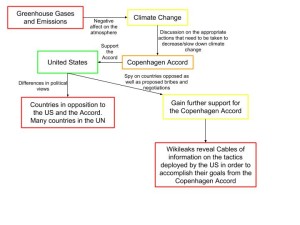The idea behind my diagram is as follows. Greenhouse gases and emissions are outlined in red for the obvious reason of them being harmful to the environment. The presence of greenhouse gases lead to “climate change”. Due to this “climate change”, it leads to the world to get together and discuss a plan to appropriately and effectively slowing down or decreasing greenhouse gases and emissions to in turn decrease the “climate change”. The United States are brought into the equation because they support the plan that was discussed during the Copenhagen Accord, but due to differences in political views, not every country in the world agrees, particularly the poorer countries that are a part of the United Nations. Which leads to the U.S. taking the necessary steps to swing votes in favor of the Copenhagen Accord. Upon spying and attempts of spying on countries that are a part of the United Nations, the United States targeted the countries the felt were in most need of financial support in order to further persuade them to come to terms with the Copenhagen Accord. Wikileaks later reveal that the United States pulled these “stunts” if you will and expose the United States for essentially bribing underdeveloped and poorer countries in order to get them to vote in favor of the Copenhagen Accord. In the end 116 countries in favor of the accord and 26 other countries intending to be in favor of the accord. And, Japan opted out of an extension of the Kyoto climate treaty in order to join sides with the Accord.
I believe the steps the United States took in order to accomplish their goals are completely acceptable. Politics are a dirty game and they always have been. The country that sits there and is complacent is never going to accomplish anything and they certainly are not going to get things to happen the way by which they want them to. This comes back to the ethics discussion from module three. The United States followed a path of action ethics, where the end goal of getting the remaining countries on board to support the plan by which they believed had the best chance of slowing down climate change was in fact more important than the consequences of the actions needed in order to achieve this. They steps in which they took may seem intrusive or as though they have overstepped boundaries, but just because there were wikileaks of evidence against the United States making attempts to spy on countries and negotiate with them, does not mean that they were the only country doing it. They also are not the first country to do it and will not be the last country to do it. The State Department cables should not have been released to the public for the exact reason of negative and ignorant criticism of the course of action taken by the United States. A job needed to be done and the United States took action in order to complete that job, the “climate change” is not going to disappear or lessen unless somebody steps up to the plate and makes an attempt to limit the greenhouse gases and emissions worldwide.


Hi my name is Joshua Wilkins and my post can be found at http://sites.psu.edu/geog30/2016/04/08/module-9-climate-change-12/
It was interesting reading your second paragraph. I come from a complete opposition to what the US did, but it was enlightening to read what you think. I can see how the political game can be nasty and the US did what was in its best interest. I just feel that this “country centered” viewpoint of the world will only lead us towards more problems. Whats the point of worrying whats best for just us when we could all be in deep water really soon. (pun intended)
Hi Ian. I’m Jessica and here is my blog: http://geog030.dutton.psu.edu/2016/04/08/climate-change-jessica-moritz/.
Your blog caught my attention because in most others ones, including mine, we added how 140 countries ended up signing on to the Copenhagen Accord. I found yours interesting that you focused on how all of this lead to WikiLeaks publishing the cables. I also liked your reasons as to why you thought what the United States did was ethical. Personally, I saw it as unethical but it was interesting how your arguments about it being ethical are just as good! It’s a shame that all the countries did not just sign on at first and maybe the United States wouldn’t have had to do what they did.